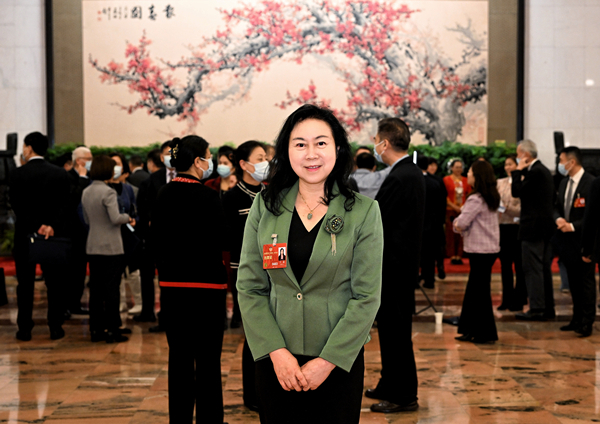CPPCC member: Digital China should focus on people
- By Zhang Rui
 0 Comment(s)
0 Comment(s) Print
Print E-mail China.org.cn, March 10, 2023
E-mail China.org.cn, March 10, 2023
A national political advisor has proposed the concept of "digital citizens" as a way to address the challenges faced by citizens in the digital age. She also has high expectations for the upcoming new national data bureau.

Wang Jing, CEO of Newland Group and a member of the 14th CPPCC National Committee, poses for a photo during the "two sessions" held at the Great Hall of the People, Beijing, March 4, 2023. [Photo provided to China.org.cn]
Wang Jing, CEO of Newland Group and a member of the 14th National Committee of the Chinese People's Political Consultative Conference (CPPCC), said that the "digital citizens" concept should be the focus of China's digital development. It is a vision of the digitalization of people's lives, enabling citizens to feel a sense of gain, security and happiness.
"Not long ago, the Central Committee of the Communist Party of China (CPC) and the State Council unveiled guidelines for digital development to build a 'digital China,' which is an important engine for promoting China's modernization in the digital age," she told China.org.cn. "Its innovation focuses on reflecting the core of Chinese-style digitization: restructuring the national governance system and governance capacity from focusing on 'things' and 'objects' to centering on 'people,' and upgrading the system and capabilities."
She recommended that the Chinese government incorporates the concept of "digital citizens" into its top-level design for digital development. With the continuous development of digital technology, massive amounts of data have been generated in digital application scenarios related to people's clothing, food, housing, transportation, entertainment, health care, education, and more. However, due to severe fragmentation, this data is scattered among various "lone islands," and citizens generate data without owning it, making it difficult for this data to become "digital assets." People's needs and pain points cannot be perceived or identified, and there are difficulties in social governance and public services. The construction of "all-access" digital citizens is a long-term and systematic engineering project that is extremely complex, and cannot be done by a single department or fragmented social forces.
Such a move would involve creating a cross-industry team responsible for developing a national-level digital citizen development strategy. The team will study the pain points and demands of citizens in different areas and stages of digital development and plan the development of digital citizen technology, standards, applications, models and scenarios.
Wang also suggested mobilizing social forces to build an integrated governance system. She believes that a trustworthy digital identity is the key to building a governance system centered around people. Digital citizenship is different from an electronic ID card as it serves not only as proof of identity but also as an entry point and data aggregator for various life scenarios, such as work, study, travel and internet access. A trustworthy digital identity can bridge the gap between online and offline scenarios and promote the use of digital technology in various fields.
The political advisor proposed creating a "digital students" pilot to intelligently construct data models. Her vision is for digital citizens to achieve secure links between public data, social data and personal data for governments, businesses and individuals, making data a reusable, intelligent and warm "digital asset," thereby establishing national awareness of the "digital bank."
"Citizens' life cycles cover the stages of preschool, school, work and retirement, on all aspects and industries," she explained. "Constructing a digital citizen intelligence model, which integrates diverse data and large-scale parameters, empowers governments and enterprises to create 'digital citizens' with AI capabilities, improving their understanding of citizens' life cycles and processes."
"For example, during the 'digital student' stage, there is fragmentation in the management of government, society, schools, families and others. By focusing on the talent training directions that align with national strategies and building long-term, cross-domain and multi-dimensional digital records of students around the stages of preschool education, compulsory education, higher education and continuing education, accurate personal and group 'digital portraits' of students can be created, providing accurate and comprehensive services for students' overall development."
In the latest updates on the "two sessions" agenda, China's State Council unveiled a plan to reform its institutions, which was submitted to the first session of the 14th National People's Congress for deliberation. One of the items is to establish a national data bureau. The proposed bureau, to be administered by the National Development and Reform Commission (NDRC), will be responsible for advancing the development of data-related fundamental institutions, coordinating the integration, sharing, development and application of data resources, and pushing forward the planning and building of a digital China, the digital economy and a digital society, among others. Certain functions of the Office of the Central Cyberspace Affairs Commission and the NDRC will be transferred to the new bureau.
Wang Jing responded positively to the establishment of the new government organ, saying that the national data bureau will fully achieve the safe and unimpeded flow of data elements, which will "help promote the modernization of the national governance system and governance capabilities."






Go to Forum >>0 Comment(s)